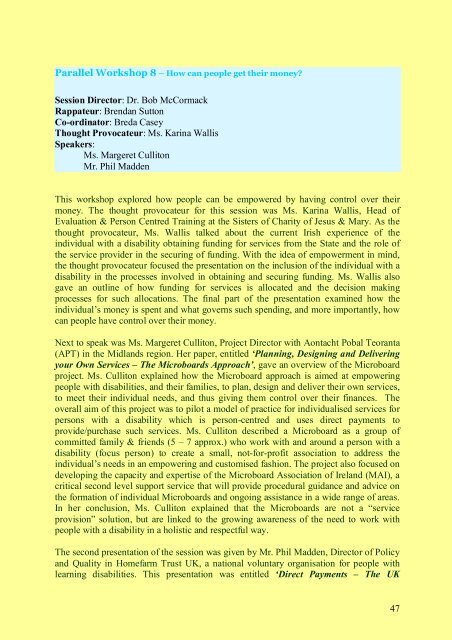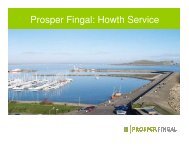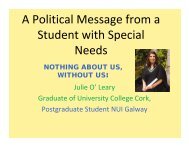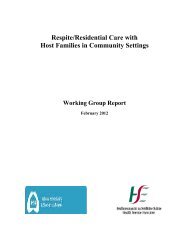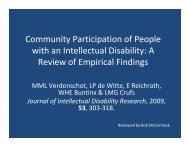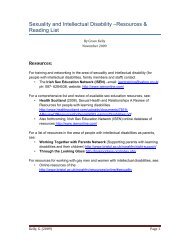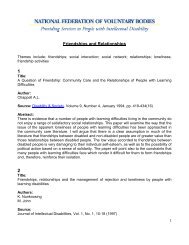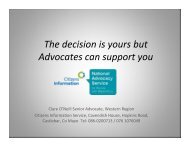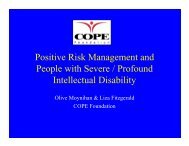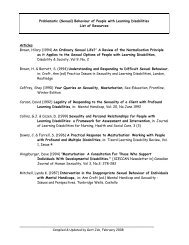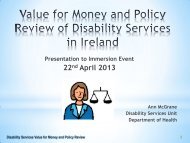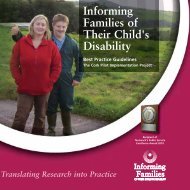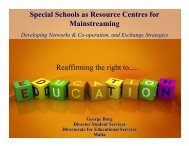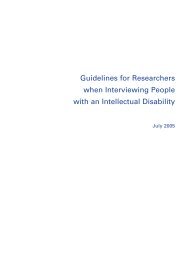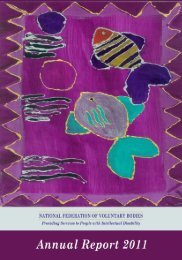Conference Proceedings Report - Final Draft - National Federation ...
Conference Proceedings Report - Final Draft - National Federation ...
Conference Proceedings Report - Final Draft - National Federation ...
Create successful ePaper yourself
Turn your PDF publications into a flip-book with our unique Google optimized e-Paper software.
Parallel Workshop 8 – How can people get their money?<br />
Session Director: Dr. Bob McCormack<br />
Rappateur: Brendan Sutton<br />
Co-ordinator:BredaCasey<br />
Thought Provocateur: Ms. Karina Wallis<br />
Speakers:<br />
Ms. Margeret Culliton<br />
Mr. Phil Madden<br />
This workshop explored how people can be empowered by having control over their<br />
money. The thought provocateur for this session was Ms. Karina Wallis, Head of<br />
Evaluation & Person Centred Training at the Sisters of Charity of Jesus & Mary. As the<br />
thought provocateur, Ms. Wallis talked about the current Irish experience of the<br />
individual with a disability obtaining funding for services from the State and the role of<br />
the service provider in the securing of funding. With the idea of empowerment in mind,<br />
the thought provocateur focused the presentation on the inclusion of the individual with a<br />
disability in the processes involved in obtaining and securing funding. Ms. Wallis also<br />
gave an outline of how funding for services is allocated and the decision making<br />
processes for such allocations. The final part of the presentation examined how the<br />
individual’s money is spent and what governs such spending, and more importantly, how<br />
can people have control over their money.<br />
Next to speak was Ms. Margeret Culliton, Project Director with Aontacht Pobal Teoranta<br />
(APT) in the Midlands region. Her paper, entitled ‘Planning, Designing and Delivering<br />
your Own Services – The Microboards Approach’, gave an overview of the Microboard<br />
project. Ms. Culliton explained how the Microboard approach is aimed at empowering<br />
people with disabilities, and their families, to plan, design and deliver their own services,<br />
to meet their individual needs, and thus giving them control over their finances. The<br />
overall aim of this project was to pilot a model of practice for individualised services for<br />
persons with a disability which is person-centred and uses direct payments to<br />
provide/purchase such services. Ms. Culliton described a Microboard as a group of<br />
committed family & friends (5 – 7 approx.) who work with and around a person with a<br />
disability (focus person) to create a small, not-for-profit association to address the<br />
individual’s needs in an empowering and customised fashion. The project also focused on<br />
developing the capacity and expertise of the Microboard Association of Ireland (MAI), a<br />
critical second level support service that will provide procedural guidance and advice on<br />
the formation of individual Microboards and ongoing assistance in a wide range of areas.<br />
In her conclusion, Ms. Culliton explained that the Microboards are not a “service<br />
provision” solution, but are linked to the growing awareness of the need to work with<br />
people with a disability in a holistic and respectful way.<br />
The second presentation of the session was given by Mr. Phil Madden, Director of Policy<br />
and Quality in Homefarm Trust UK, a national voluntary organisation for people with<br />
learning disabilities. This presentation was entitled ‘Direct Payments – The UK<br />
47


